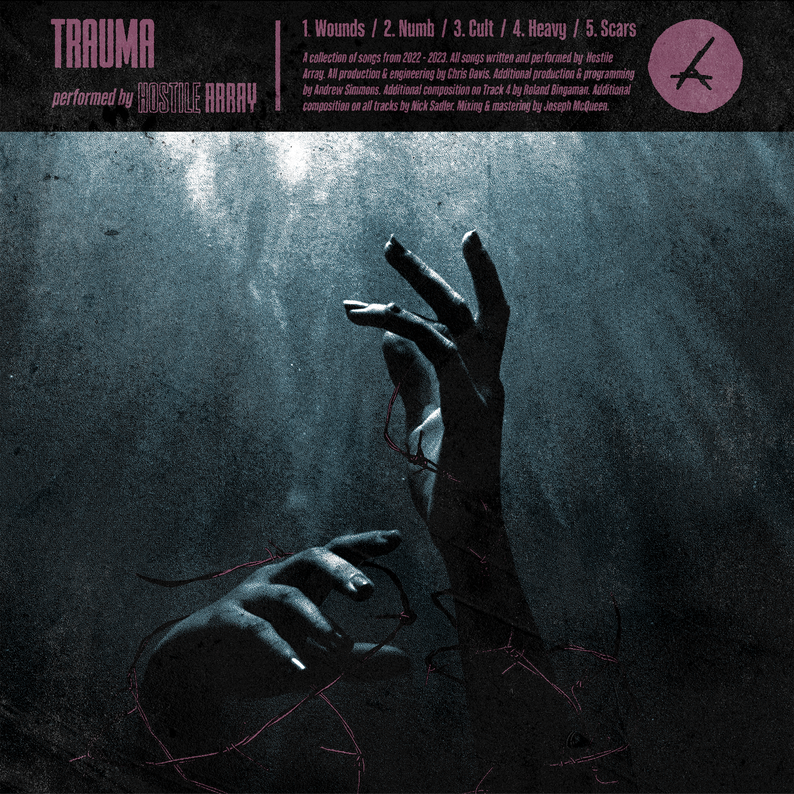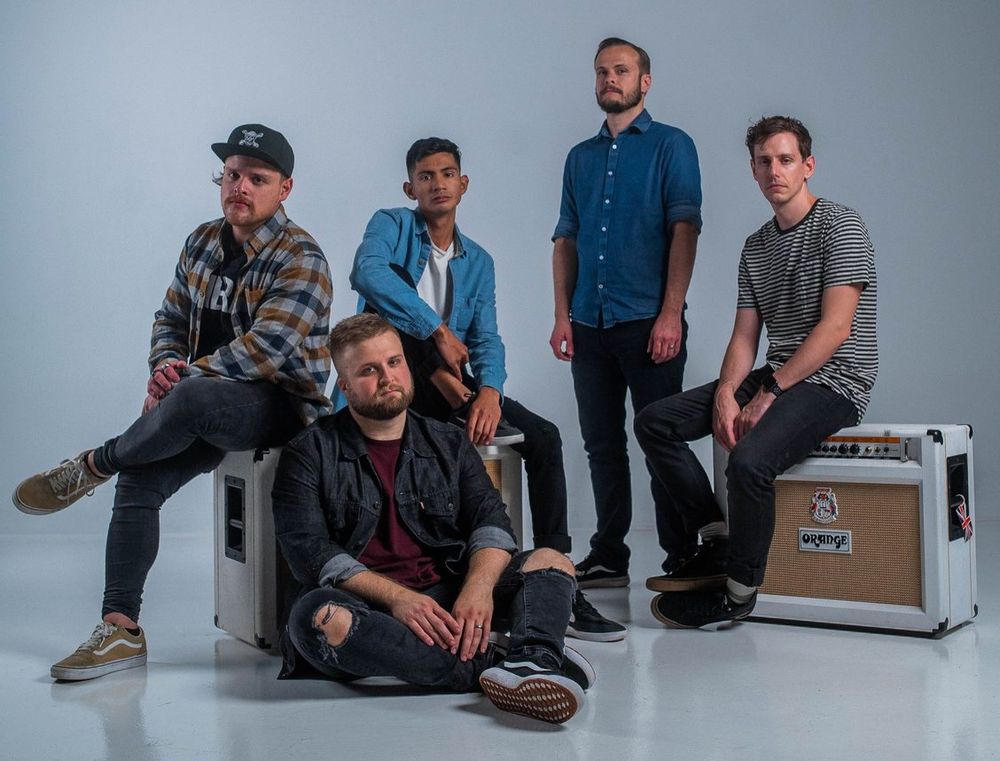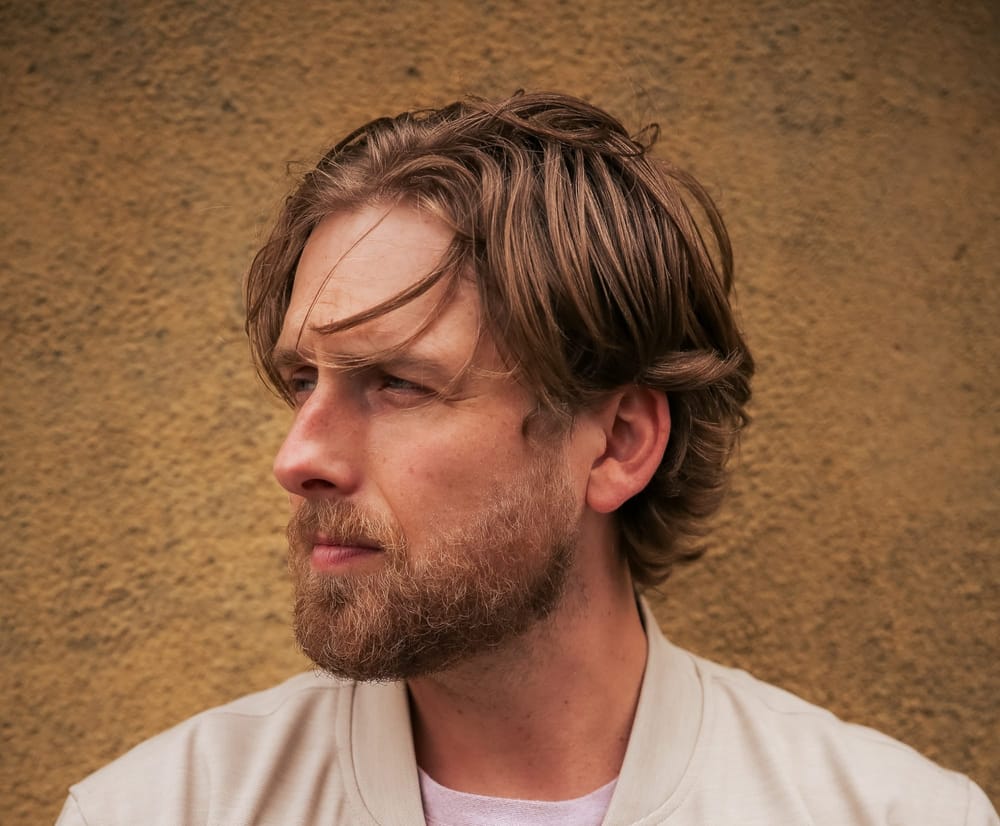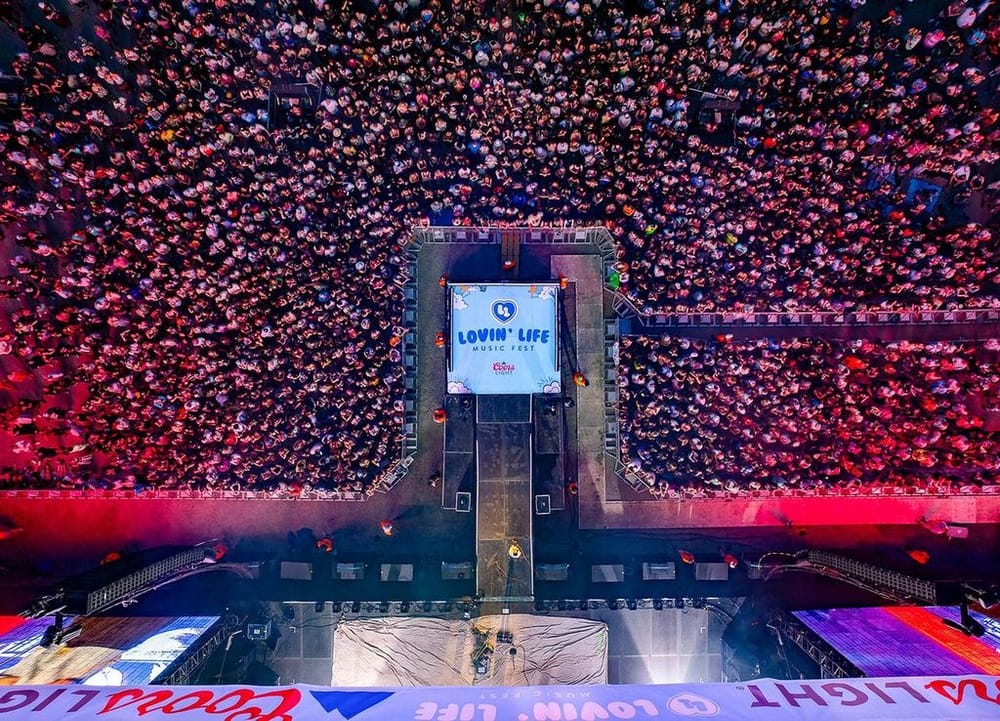Post-Hardcore band Hostile Array has released their latest EP today, titled Trauma. About the EP, vocalist Brendan Frey had this to say:
“This EP is a collection of singles that we felt belonged together in context. Each song was written as a way to process the trauma and associated mental health struggles several of us have shared over the years. Working on these songs was not only lyrically therapeutic, but creatively as well. We really tried to challenge ourselves to experiment with our sound and not worry about holding ourselves to any specific genre expectations.”

I had the opportunity to chat with Brendan ahead of the release. Check out our interview below about this EP, mental health, and more.
MSM:
Hi, I'm Melanie and I'm here with Brendan of Hostile Array. Thanks for chatting with me. To start out, tell me about your journey with creating music, how you got started, and if it was just something you always knew you wanted to do?
Brendan:
Yeah, definitely. So I started playing music probably when I was about like, eight years old, just getting into like, you know, learning piano and things like that, things that parents usually try to get kids to learn and everything. But I really started getting into, you know, the heavier side of rock music around the time I was like 11 or 12 and picked up a bass guitar and just thought, you know, I would probably at some point get into a band or something like that. I know my brother was already kind of seeking out bands at that time. And he was about four years older than me. And by the time I turned 13, we actually started our first actual band together and we've been playing in the music scene ever since.
MSM:
Was there a certain band that introduced you to, or kind of got you started with, heavier music?
Brendan:
Yeah, actually. So I grew up in a really kind of closed off kind of evangelical culture. And some of like the heavier side of like Christian music really kind of caught my eye when I was first getting into music. Yes. So things like Project 86, their album Drawing Black Lines, that was like one of the first albums I really got into that was on the heavier side. Yeah, that's probably where it would start for me.
MSM:
Ok. So who are some of your biggest musical influences and how have they helped to shape your sound?
Brendan:
I feel like it's kind of changed over the years for sure. Probably one of the most influential artists for me growing up was the band Underoath. Spencer Chamberlain is one of the reasons I wanted to start learning vocals. And nowadays I feel like it's a little bit of everything. Like, there's like really anyone that's just super creative kind of sparks my interest as I've gotten older, and kind of started getting into more like hip hop music and everything. Artists like Tyler the Creator is a huge influence on things from like a production standpoint. Just how you see, you know, music in general. You know, seeing artists like like Bring Me The Horizon who have kind of really started not focusing on any specific genre and just kind of making whatever they want has been a huge influence for me more recently. But yeah, I would say definitely Underoath is probably one of the biggest influences I've ever had.
MSM:
Yeah, They're Only Chasing Safety is one of my favorite albums of all time.
Brendan:
Yeah, same, that's actually the first album that I ever learned to scream along to.
MSM:
That's a good one. So how do you approach the songwriting process and where do you draw inspiration from?
Brendan:
So, for songwriting, for us, it's, it's really kind of split mainly between our guitarist and myself. We usually send files back and forth to each other via Dropbox and work on different sessions together. And usually after we've kind of demoed out material and bring in the rest of the band to kind of give their 2 cents on everything for their own respective parts, bass and drums, etc. And really once we have a good demo fleshed out, we usually end up working with the small producing team that we have kind of built up. We have a good relationship with our friend Chris Davis who plays in The Ghost Inside, and he kind of helps really refine some of the elements of our music. And then we have another guy named Andrew Simmons who helps us with a lot of the production aspect cause, you know, finally getting that final layer of post-production is kind of hard to do when you don't have a wide background in production. I mean, we end up writing a lot of it prior, but he kind of gives it that nice finishing touch to really take it to the next level.
MSM:
Yeah. So you're about to release your EP Trauma, which is dedicated to mental health struggles that you guys have dealt with. Is there a song or a lyric off of the EP that means the most to you personally?
Brendan:
Yeah. I'd probably say our song "Wounds". The chorus line – "if time heals wounds, then why am I still bleeding?" – it kind of describes a lot of how I've felt dealing with my own trauma, you know, things that feel like they were so long ago but still are present in your every day, that affects the way you see things and shapes who you are. I'd probably say that's the most impactful lyric for me for as far as the writing process goes.
MSM:
Okay. Would you be able to talk about what each song deals with?
Brendan:
So it's weird when you start writing about stuff that's really introspective and close to you, it's like how much of your personality and your past do you put out there? What I would feel comfortable saying is it's just dealing with the pain that those close to you could have inflicted.
MSM:
Okay. So for anyone who may listen to the EP, what advice would you give to anyone who may be going through something similar and relate to the songs?
Brendan:
For me, one of the most helpful things has been going to therapy. I did probably about five years of therapy consistently. And really finding someone that you can trust to open up to and work through your issues is huge, especially if you've gone through traumatic experiences or are dealing with depression or anxiety or whatever your mental health issue may be. I really hope that we don't romanticize issues with mental health, but that we find commonality with one another to just realize that we're not the only ones out there that feels this type of way. And that it's not rare...this is something that everyone struggles with to some extent. So I would definitely say hopefully, you know, people see us as a way to destigmatize some of that.
MSM:
Yeah, definitely. So what would you say your goals are for your music career? Where would you like to see yourself in the next few years?
Brendan:
It's always kind of hard to gauge that, honestly, because I know when I was younger, I really wanted to make music as the way that I actually paid my bills and everything. As I've gotten older and it didn't quite pan out exactly that way, and I just really wanna be able to share what I'm creating with people and get it out there to as many people as possible. So, from a monetary aspect, I'm not super worried about that career wise, but I do want to see how far I can take it, you know? Without having to sacrifice some of the stability that I've kind of been able to gain through my own career and everything. All of us in the band have our own career paths, whether it be in technology, a government sector, or even photography. We've all got our own thing that we're working towards to make it so that we can live stably.
MSM:
To keep doing what you're doing.
Brendan:
Yeah, because this is kind of a passion project, you know? If someone wants to help us get to the next level, I would never shy away from trying to find a way to reach more people. But I think it takes a little bit of the creative pressure off of us, and it allows us to experiment a little bit more when we don't have to worry about where our next meal is coming from.
MSM:
Yeah. So it's mostly important to you like to connect with people with your music?
Brendan:
I think so, yeah. That's, that's probably what is most important for me. There is being able to create something and, and connect with people through that is, is just so important.
MSM:
Yeah. So what is the first concert that you ever attended?
Brendan:
Well, as I said, I kind of grew up in a closed evangelical bubble, so the first concert I ever went to was a band called Pillar that played at this little rundown venue in Baltimore called The Thunderdome that doesn't exist anymore. I was probably like 12 years old when I first went and the youth pastor at the time took us there and he had no idea what he was getting himself into. The whole area just was this rundown, sketchy, dive bar kind of feel. It was a good time, though. Just the energy from that made me want to get into this even more, and it's like nothing else I can really describe, you know? And it's kept me going. I'm just about 30 now, and still very interested in something that kind of sparked in me when I was around 12.
MSM:
Yeah. So you're just watching and you're like, I could do that .
Brendan:
It's kind of like you're looking at this person like, am I enamored with what's going on on the stage, or is that what I want to be? And I think I leaned more into the, this is what I want to be, I wanna be able to do this. And, obviously, my view of that has kind of evolved over the years, but still, that same drive and that energy draws me to it, for sure.
MSM:
Okay. Do you ever do karaoke, and if so, do you have a go-to song?
Brendan:
I don't think I've ever done actual karaoke, like going to a karaoke bar or anything like that, but I've definitely done my fair share of sing alongs with friends. Any of the early 2000s emo hits are probably gonna come up on there, and we're gonna sing as loud as we can. I don't think there's any set song though.
MSM:
Okay. And then lastly, do you have any closing messages for your fans?
Brendan:
Yeah. Just the whole theme of the EP is, is about dealing with trauma, dealing with mental health issues, and dealing with things that are hard to talk about. I wanna make sure that people understand that they're not alone in their struggle, and that a lot of the people that talk about depression and anxiety don't really focus on the trauma aspect of it and how that can shape you. I'm hoping that as they go through listening to this, they can connect with that to some extent.
MSM:
Okay. All right. Thanks for chatting.
Brendan:
Yeah, thanks for having me. I appreciate it.
HOSTILE ARRAY: Brendan Frey – Vocals; Garrison Frey – Guitar; Hector Fernandez – Guitar; Brody Barbour – Bass; Fredy Menjivar – Drums
FOLLOW HOSTILE ARRAY
WEBSITE // INSTAGRAM // FACEBOOK // YOUTUBE
*PHOTO PROVIDED COURTESY OF DON'T BLINK MUSIC GROUP



